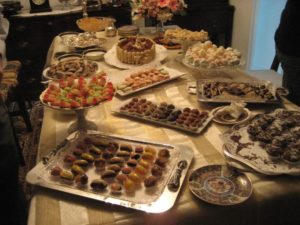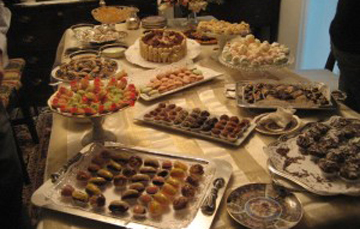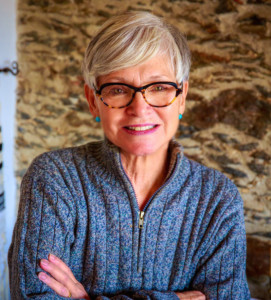“Mimouna”
Concluding Passover With A Sephardi Festival
Mimouna, (pronounced “mee-moh-oo-na” ) is the name given to the little known seder that celebrates the end of the eight days of the Passover festival According to journalist Ophir Toubul (Cafe Gibraltar), “The name of the holiday, “Mimouna,” has several different, fascinating meanings. The most famous of them attribute the name to the Hebrew word “emuna” which translates as “belief.”
Originating in Morocco but popular throughout Sephardi Mediterranean Jewish communities, the Mimouna celebration marks the completion of the crossing of the Sea of Reeds, the actual beginning of the Jews’ path to freedom. The Mimouna celebration honors Rabbi Maimon, the father of Moses Maimonides who was the beloved leader of the Moroccan Jews. In Sephardi synagogues in Mediterranean countries, the synagogue is opened at one minute after midnight marking the literal end of the eighth night of Passover. The Torah is taken from the ark and the Song of Songs is read while congregants dance in the aisles. Following the Torah reading, the Mimouna festival begins. Families visit neighbors and friends and share traditional Mimouna foods including pita bread, cut into pieces and eaten by dipping a piece into honey, symbolizing how our families are glued together and that slavery and oppression will never again separate us.Mr. Toubul writes that “on the eve of Mimouna, it was customary not to eat meat — only dairy products and fish, which symbolize abundance and festiveness. In one Moroccan city it was customary to put a bowl with a live fish on the table. A sign of luck, of course.”
Interestingly enough, writes Mr. Toubul, Mimouna celebrates North African culture, specifically the close relations between Jews and Muslims there. In many places it was the Muslims who brought wheat, milk and butter to the Jews at the end of the holiday so they could resume their usual cooking habits. Jews in Morocco were viewed as special people – as those who who blessed the land for the entire year, and the Muslims saw the holiday as an opportunity to pay back their Jewish neighbors. “In the city of Azemmour, Muslims allowed the Jews to use th eir fields and gardens for the entire day, out of a belief that the Jews would bless the land and leave it fertile.”
eir fields and gardens for the entire day, out of a belief that the Jews would bless the land and leave it fertile.”
In modern times Mimouna is celebrated in Israel, Turkey and now in Sicily and southern Italy with feasting, music and dancing. So plan your Mimouna celebration! Serve a dairy meal, complete with pita bread dipped in honey and raise a glass, toasting family and friends and offer everyone blessings for a year of health, happiness and good fortune. Chag Mimouna Sameach!

